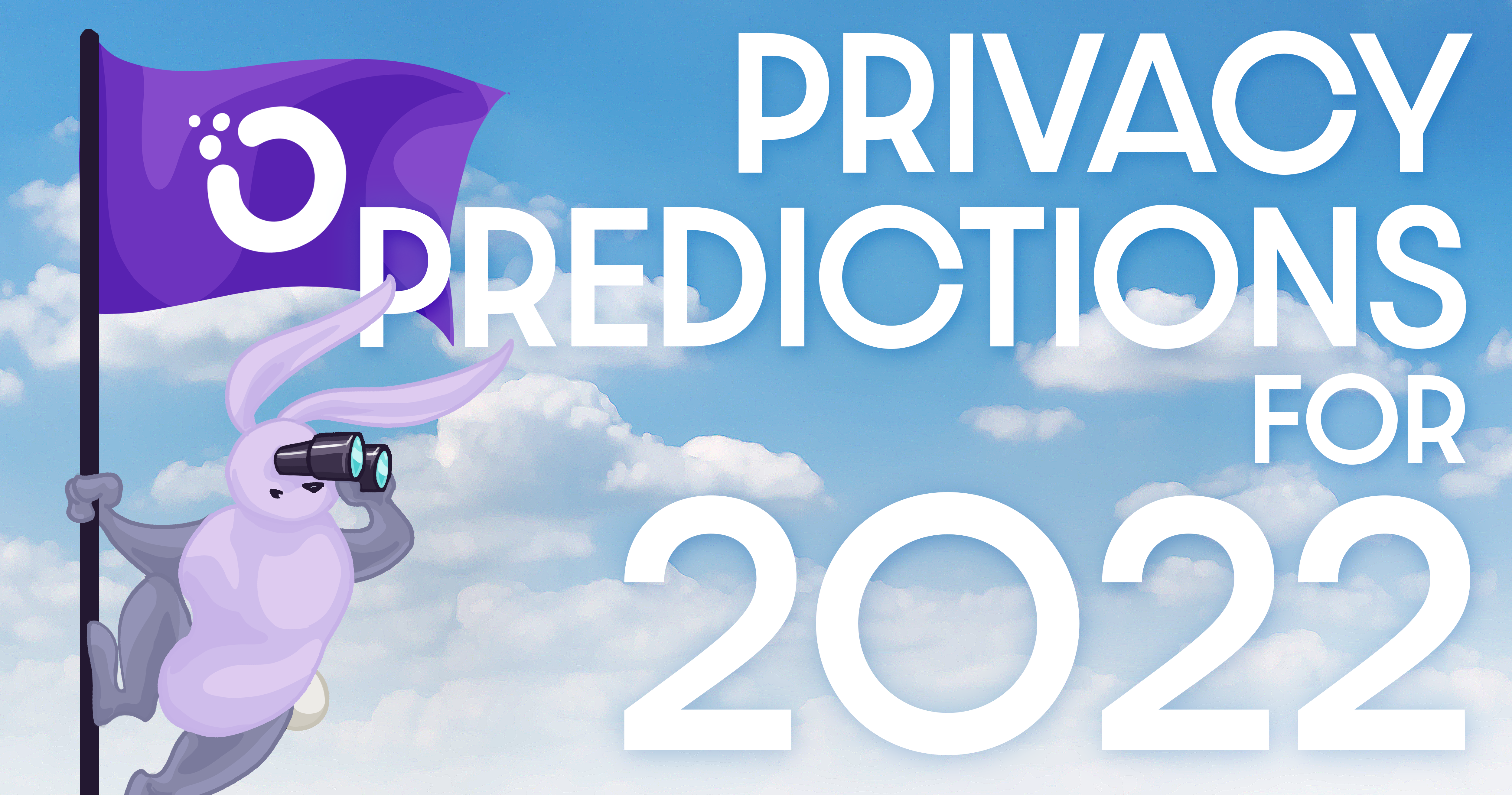
Digital privacy in 2022: Orchid’s top 5 privacy predictions for the coming year
Dec 20, 20212021 has been a year of major cultural shifts. The movement toward remote work and online activity that began in 2020 continued throughout the year—ultimately culminating in a fascination with new digital concepts like the metaverse. And as people spend more of their time working, playing, socializing, and falling in love in online spaces, digital privacy has never been more important.
Looking into 2022, the trend toward online life looks set to continue. And while no one can ever truly know what the future holds, certain trends will continue into the year ahead. Here's what they might mean for the future of digital privacy.
Synthetic data will become more popular
Concern about data privacy has been increasingly prevalent in recent years—but it reached new heights in 2021. A survey by the multinational professional services network KPMG found that 86% of consumers feel a sense of growing concern about data privacy, and 78% feel concerned about how much data is being collected. Moreover, some 40% of respondents said they don't trust companies to handle their data ethically. 13% don't even trust their own employers.
As the public's concerns about data privacy continue to grow, regulators are responding with new rules, policies, and promises that data will be used responsibly. For example, in the U.S., many states are adopting privacy laws that require companies to give consumers notice that their data is being collected, and a say in how it is used. These laws also specify the amount of time a company has to correct a mistake, which companies are affected by the law, and whether consumers can use tools to automate opt-out requests (such as opting out of data sales automatically in your browser.)
These policy solutions may help to assuage consumer concerns. Nonetheless, in recent years data has become such an integral part of strategic marketing and other business operations that many companies cannot operate successfully without it. Therefore, innovators come up with a new solution: synthetic data.
Synthetic data is an inexpensive alternative to real-world data. Instead of being collected from consumers, it is generated from computer simulations or algorithms. Using it reduces the limitations of using sensitive or regulated data, and allows information to be tailored to certain needs and conditions that cannot be obtained through traditional methods. And synthetic data is particularly useful for training artificial intelligence (AI)—in fact, some research has shown that it can be better for training an AI model than data based on "real" objects, events, or people.
When it comes to privacy concerns and regulations, synthetic data techniques can be used to produce new datasets that hide personal information. For example, an automotive researcher training an AI could blend multiple images of real-world cars to create new, synthetic images of cars; a medical researcher could combine data from tens of thousands of medical records to create limitless reiterations of synthetic data.
While the field is just a few years old, there are already over fifty companies that specialize in producing synthetic data. And according to a report by Gartner in June 2021, most of the data used in AI will be artificially generated by 2030. The trend is clear, and it's likely that synthetic data will become more prevalent in 2022.
The value of personal data will decline
As synthetic data becomes increasingly popular as a cheaper, more efficient, and more private solution than "real" data, it's probable that the value of personal data will decline.
For years, the belief that "data is the new oil" has been the norm—and with good reason: a report by Global Industry Analysts Inc. projects that the value of the global "big data" market to reach $234.6 billion by 2026. However, as regulators continue to tighten data collection practices in the name of online privacy—and alternate data solutions continue to gain popularity—the value of personal data could start to drop.
But even if personal data doesn't lose its value anytime soon, a shift in the economics of data may be imminent. Today's data economy is highly centralized: companies like Google, Facebook, Twitter, and others monitor and collect data about our online behaviors across the Internet.
However, as consumers become more aware of data collection practices, they're increasingly looking for a cut of the profits. In a recent report by the Wall Street Journal, billionaire real estate mogul Frank McCourt noted that "an unprecedented amount of value is being created by everyone's data—and yet there's a total disconnect between the creation of that value and who receives it."
To address this issue, a growing number of startups are using blockchain technology and other solutions to give consumers control over how their data is produced, sold, and ultimately used. As people become increasingly aware of the value of their data, it's likely that more and more people will use and demand solutions that shift the data economy in their favor.
While the primary reasoning behind this shift may be financial, it also has major implications for digital privacy. Giving people the option to sell or not sell their data also allows them to decide whether or not their data will be shared at all: not selling personal data equates to maintaining control over it.
Some analysts have pointed out that giving people the option to sell their data could mean that people with low incomes may have a much higher incentive to sell their data than their financially comfortable peers. As tech journalist Ciara Byrne entitled an article for Fast Company, "Trading privacy for survival is another tax on the poor."
"Work from home" will become "work from everywhere"
The massive shift toward remote work that began in 2020 continued into 2021—and it seems unlikely to stop anytime soon.
But although many companies, communities, and individuals have embraced the age of remote work, there have been some bumps along the road. Many organizations were completely unprepared for the challenges posed by the widespread shift to telecommuting. Out of the office, employees were suddenly vulnerable to phishing attacks, home network hacks, and other digital privacy threats. Perhaps the most famous example took place in July of 2020, when a teenaged boy impersonated a Twitter employee to gain access to the accounts of many of the world's most influential politicians and celebrities.
Today—nearly two years after the start of the pandemic—companies are much better equipped to prevent and handle problems with digital privacy and security. Employees are trained in how to identify and navigate social engineering schemes, home networks are fortified with additional digital security measures, and cloud storage practices are augmented with two-factor authentication and other safety measures.
While these improvements in digital privacy and security measures have led to a safer and more flexible remote work culture, there are still some limitations on what employees can and can't do. Companies that work with particularly sensitive data may still require their employees to come into the office to access it—or at the very least, access the sensitive information from fortified home networks.

As digital privacy and security measures continue to improve for remote work situations, though, it's likely that today's "work from home" culture could evolve into "work from anywhere." Firewalls, VPNs, and other tools that can easily be ported from network to network can allow people to work online safely from anywhere in the world.
This is especially important as the popularity of "digital nomad" lifestyles continues to increase. A 2021 study by the Harvard Business Review found that the number of Americans that describe themselves as digital nomads rose from 7.3 million in 2019 to 10.9 million in 2020 --- an increase of 49 percent.
Multicore processing will be everywhere
As everyday computing tasks continue to become more complex, the average PC or handheld device needs to be equipped with relatively larger amounts of processing power. Consequently, manufacturers have increasingly turned away from single- and dual-core processing in favor of multi-core processing. This refers to an integrated circuit with two or more attached processors. These devices perform better, reduce power consumption, and simultaneously process multiple tasks than their single- and dual-core counterparts.
While an increase in multicore processors on PCs, phones, tables, and more will certainly improve the speed and efficiency of computing, multicore computing comes with a unique set of privacy and security challenges.
Cambridge University researcher Robert Watson said in an interview with IHaveNet that multicore computing systems are susceptible to concurrency attacks. This type of attack occurs when a malicious actor simultaneously activates two or more actions on a processor, creating digital confusion.
"When programmers reason about concurrency wrong, then applications can behave unpredictably," he said. "They can crash, data can be corrupted ... and attackers could bypass a variety of security techniques, from sandboxing to intrusion detection.
"It is precisely these sorts of attacks that we are worried about: the ability to escape from sandboxing and attack the broader mobile platform, stealing or modifying data, gaining unauthorized access to networks, etc."
The imminent move towards open intellectual property
Traditionally, intellectual property (IP) in the innovation sphere is kept within a closed, proprietary structure. When a company seeks to create a product, it conducts each stage of the research and development (R&D) process by itself. The product, as well as any knowledge that was created during this process, remains its own property.
The open IP movement, on the other hand, is characterized by freely sharing information throughout the R&D process. Firms that take part in the open IP movement take a much more collaborative approach to innovation: they make alliances with other companies, hold hackathons, and actively collaborate with people and businesses.
While the thought of private organizations sharing the results of their R&D efforts with possible competitors may seem counterintuitive, the experience of the open IP movement has been proven to accelerate the process of innovation, as well as to create products and services that better serve consumers' needs. This approach to innovation has also led to the development of collaborative profit-sharing models that reward all contributors according to their participation.
In this way, the open IP movement shares certain traits with the open-source movement, which also encourages innovation through collaboration. Many projects being developed for the decentralized web, also known as Web3, are built on open-source technology. Open-source software developers freely share code they've developed online. Through platforms like GitHub, other developers are able to make suggestions for improving the software. Without the open-source movement, many of the technologies we take for granted today would not exist, or would remain sealed behind patent laws. (Fun fact: Orchid's decentralized VPN market is built on open-source software. Click here to view its source code.)
While the open IP movement is not restricted to any single industry, it will likely have powerful implications for the digital privacy sector. As threats to our data become more complex, more robust solutions are needed. Therefore, open IP—like open-sourcing—is likely to play an essential role in the future of digital privacy technology.
Orchid's commitment to making digital privacy accessible to all
Orchid's decentralized VPN was developed to help restore the Internet as a place of freedom and exploration. Both today and in the year to come, Orchid will continue to work to make it easier for people to control how their data is used online. Orchid's flexible VPN marketplace is an essential part of this objective---it gives users complete control over their Internet connections.
Orchid is fueled by a system of incentives that ensure users always have access to ample bandwidth. Orchid is pay-as-you-go, so users never pay for bandwidth they don't use. And it's easy to start using Orchid—once the app has been downloaded, anyone can get started with just $1 and an ordinary credit card.
Download Orchid today to start exploring the Internet freely. Happy New Year!
If you enjoyed this blog, subscribe here for privacy news, commentary, and product updates from Orchid.



